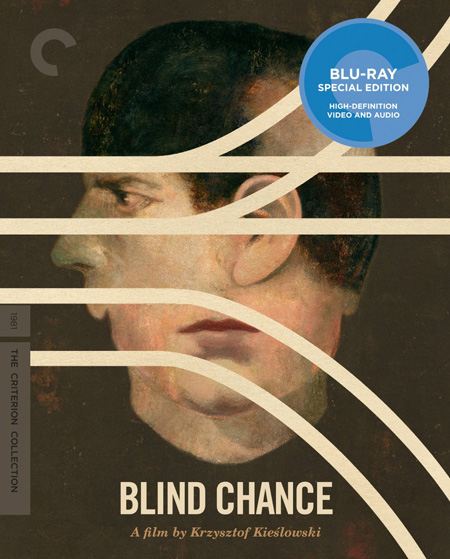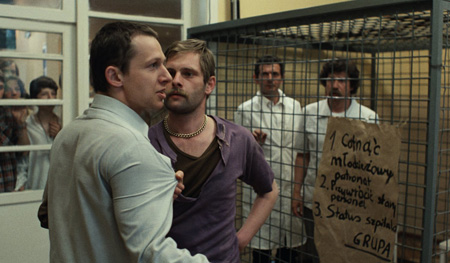
KIEŚLOWSKI’S ALTERNATE UNIVERSES
By Raymond Benson
The
late Polish director Krzysztof Kieślowski often dramatized
the theme of one’s destiny—whether it be determined by fate or by random
coincidences. His most well known work, the Three
Colors trilogy (Blue, White, and Red), certainly deals with the subject of chance, as do several
episodes of his celebrated television miniseries, The Decalogue.
Made
in 1981 during the Solidarity movement and a time of political upheaval in
Soviet-occupied Poland, Blind Chance explores
the question of “what if?†If you did something as insignificant as bumping
into another person, would that change the course of your life?
The
film offers three alternate “lives†of a medical student named Witek (superbly played
by Boguslaw Linda). The first five minutes provide us with brief glances of
Witek as a child, a teenager, and then a young adult. After the death of his
father, Witek decides to drop out of medical school and travel to Warsaw to visit
his aunt. He is late to the station and must run through a crowd of people to
catch the train. What happens on the platform is the pivotal catalyst for the
rest of the story. He almost collides with a drunk—but doesn’t touch him—giving
Witek that extra second or two that allows him to catch the train. While
onboard, he meets an elderly Party-line Communist who takes a fancy to Witek
and offers him a job in the city. So, in this lifeline, Witek becomes a
Communist and works in opposition to the young people of his age group who are
protesting the government.
In
an alternate scenario, though, Witek actually collides with the drunk, but the man
with the beer remains standing. This causes Witek enough of a delay that he
misses the train. He then gets into a scuffle on the platform with a police
officer and is arrested. Once Witek is back on the street, he is forever prejudiced
against the Communist government. Thus, in this life he becomes an anti-Soviet activist
and a practicing Catholic.

Finally,
in a third possibility, which may be what really happened, Witek accidentally knocks
down the drunk—delaying the young man a few seconds longer—so that Witek not only
misses the train, but he avoids the policeman on the platform. Instead, he runs
into a female medical student colleague. She persuades him to stay and return
to his studies. Witek marries the girl, has children, becomes a successful
doctor, and remains apolitical. Witek lives a happy life—until Kieślowski
pulls the rug out from under us and delivers a knife wound of an ending.
The
picture might remind viewers of Peter Howitt’s 1998 British film Sliding Doors, which also examined
alternate life paths—but only two. Blind
Chance does it with three, and the movie was made more than fifteen years
earlier.
The
task of editing such a story is, of course, challenging, and editor Elzbieta
Kurkowska deserves special praise for keeping the complex narrative comprehensible.
In a 2003 interview, filmmaker and Kieślowski associate
Agnieszka Holland explains that she had seen the first cut of the film, which was
initially too confusing and didn’t work. Kieślowski made a
thorough assessment of what had gone wrong and completely recut the picture
with Kurkowska—resulting in the brilliant piece of work presented here.
If
you can get past the heavy political discourse that is an integral part of the
story, you will find Blind Chance to
be a fascinating and intelligent scrutiny of the way life rolls the dice for us
all.
The
film was banned by the Polish government prior to its release, due to inherent criticisms
of the government. The picture was finally released in Poland in 1987 with some
cuts dictated by the censor board. It wasn’t until the fall of Communism in
Europe in 1989 that the complete works of Krzysztof Kieślowski
(who had been making movies since the 70s) emerged from behind the Iron Curtain
so that the rest of the world could discover him.
The
Criterion Collection has reassembled Blind
Chance to its 1981 version—with the exception of an audio-only portion of a
few seconds of a police beating that, for some reason, “couldn’t be restored.â€
The 4K digital transfer, approved by cinematographer Krzysztof Pakulski, is
clean and sharp, providing the viewer with the best possible edition of this important
work. The soundtrack is in uncompressed stereo.
Supplements
include the Holland interview; a new interview with Polish film critic Tadeusz
Sobolewski; and demonstrations of the nine pieces of the film that were
censored in 1987. The booklet contains an essay by film critic Dennis Lim and a
1993 interview with Kieslowski.
Blind Chance is recommended for
discerning cinema enthusiasts looking for a little European history,
intelligence, and artful filmmaking. A truly gifted auteur, Kieślowski departed this plane of existence way
too early (in 1996 at the age of fifty-four). Perhaps he is now living his own
alternate timeline.
CLICK HERE TO ORDER FROM AMAZON
REMEMBER! YOU CAN HELP CINEMA RETRO KEEP THE DREAM ALIVE BY SIMPLY ORDERING ALL YOUR AMAZON GOODS BY CLICKING ON ANY LINK TO THEM FROM OUR WEB SITE! THE COMMISSIONS EARNED HELP US ENSURE THAT WE KEEP ADVERTISING TO A MINIMUM.